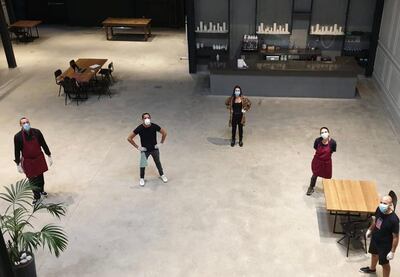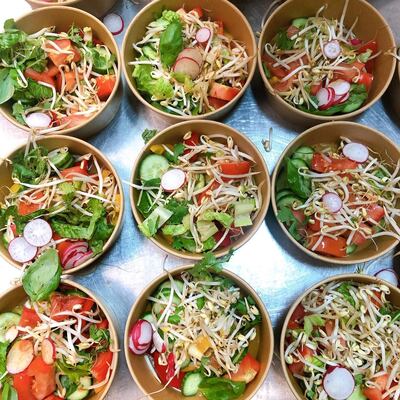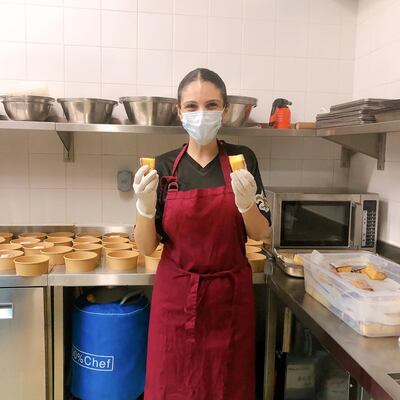A Dubai restaurant has reopened its kitchen to cook meals for vulnerable communities and front-line healthcare workers in the city.
Kenza and Patrick Jarjour, the husband-and-wife team behind dining and event space Inked, in Alserkal Avenue, wanted to “give back to the community of Dubai” after they closed their two kitchens amid the coronavirus crisis.

For the past two weeks, they have been cooking about 100 meals a day, taking donations from their suppliers who were left with a food surplus because of the mass closure of restaurants. They now hope to triple this production, helped by Alserkal Avenue’s Pay it Forward initiative. The avenue’s management has waived rent for the next three months for its tenants, and is supporting charitable schemes within the community.
“We said, let us cook for two weeks, that is what we can do, based on what the suppliers are doing,” says Patrick. “Then we had ideas of what can be done in Ramadan. This is our response to Alserkal Avenue’s challenge, to give back, so we transformed Inked into a community kitchen. We are taking all the measures to bring back some of the team members and put them in one location where they can be safe, and after that to raise our capacity to 300 meals a day.”

Kenza adds: “If you know you can be useful, and you have the space and the kitchen to do it, it is a no-brainer.”
A large part of the challenge is logistical. Suppliers cannot sell food that is nearing expiration date, but they can donate it to Dubai Food Bank and other such entities. Waste is a major problem; Patrick estimates that 20 per cent of food items are thrown out before they even get to the supermarket. Inked is working as much to cook meals as it is to help develop a new supply system, ensuring that extra food from suppliers finds its way to the needy.
Sometimes that means Inked has to turn supplies away, but finds other restaurants that have spare capacity. “It’s really amazing, because the moment this idea started, so many people wanted to join one way or the other,” says Kenza. “It can create this ripple effect. We are receiving a lot of messages from people asking what they can do to help, which is really encouraging.”
Already, other food and drink outlets have lent a hand, such as Nightjar and Appetite. But Inked has depleted the reserves of its kitchen and is seeking donations of Dh25 per meal to continue for as long as possible, particularly through Ramadan. There is an option for companies to sponsor.
Alserkal Avenue galleries are also supporting the initiative, selling works on Instagram. Lawrie Shabibi has raised Dh25,000, selling more than 50 works by Mohammed Ahmed Ibrahim in the space of 24 hours, while Green Art Gallery likewise quickly sold out of its four prints by Hera Buyuktasciyan. All the money amassed will go to Inked.
Abdelmonem bin Eisa Alserkal, the philanthropist behind the avenue, has also chipped in to buy 1,000 meals.
Inked works with Dubai Food Bank to determine where the food goes. “We make it at Inked, and we trust their expertise to distribute it,” Patrick says. Some meals go to vulnerable communities facing food shortages, such as those in Al Ras and Al Quoz. Others, administered by the Dubai Health Authority, go to front-line workers and potential patients.
Inked opened four years ago and is well known for its novel cuisine. The menu for the donated meals, however, is dictated by what is available from suppliers. Dishes will be healthy, Kenza says, with “some vegetables, a starter, some protein, a dessert – and with love”.
















